
 NYC Housing Authority311
NYC Housing Authority311 Search all NYC.gov websites
Search all NYC.gov websites
NextGenNYCHA Sustainability Agenda:
Year One Highlights
NYCHA begins the largest public housing energy-efficiency project in the nation
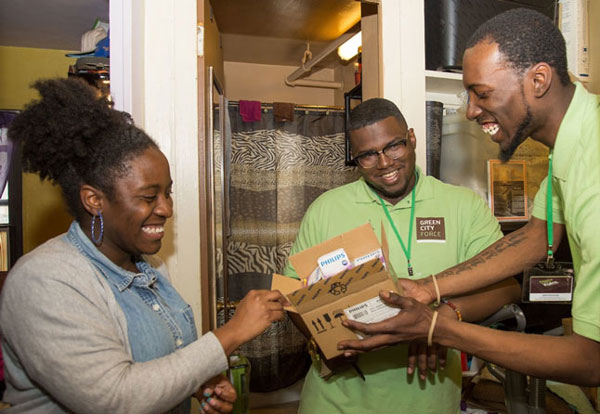
Green City Force (GCF) corps members deliver efficient light bulbs to a tenant at Clason Point Houses in the Bronx. GCF trains young NYCHA residents for green jobs.
This spring NYCHA began to improve energy efficiency at 34 developments as part of the first phase of a program announced in 2015. All 34 developments will receive more-efficient LED (light-emitting diode) bulbs and fixtures. Since the initial announcement, the program has grown to $300 million (from an original $100 million), and is now slated to serve 120,000 homes -- two-thirds of all NYCHA apartments.
Common area and apartment lighting retrofits began in March at 18 Brooklyn developments, funded by a loan from the New York State Green Bank. Lighting and water retrofits began in April at 16 other sites. This work will also include comprehensive heating upgrades, including boiler room replacement, at Whitman Houses in Brooklyn.
New stormwater-friendly walkways and plazas also deliver cleaner waterways
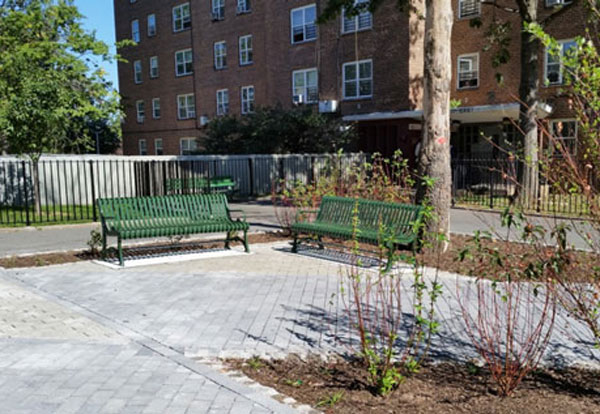
Permeable pavers at Edenwald Houses allow rainwater to filter into the ground rather than run off and overwhelm the sewer system.
Green infrastructure, such as rain gardens, underground detention, and porous pavement, helps improve local drainage while beautifying grounds and preventing the release of pollution into nearby waterways.
The first of two phases at Edenwald Houses in the Bronx is nearly complete. The Department of Environmental Protection's $10.6 million project will capture approximately 10 million gallons of stormwater each year, easing pressure on the sewer system and decreasing overflows during rainstorms. The second phase of the project will be finished late this year.
Resident Green Committees awarded $10,000
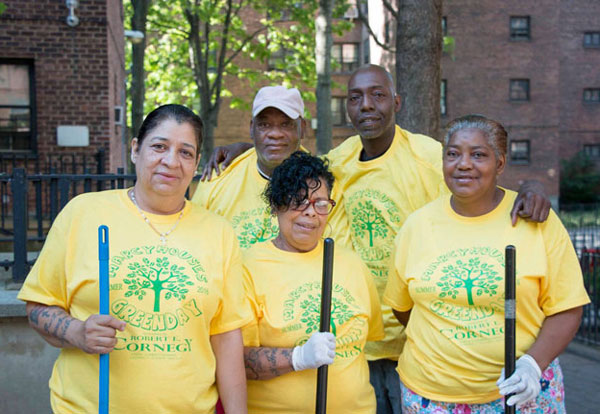
In 2016, five Resident Green Committees (RGCs) received grants and resources to support sustainability projects. Four developments (Pomonok, Ingersoll, Beach 41st Street and Ravenswood) received grants from the Citizens Committee of NYC. The Lower East Side RGC was awarded $2,200 by the NY City Council to rehabilitate several gardens.
Started in 2010, the RGC program provides a platform for NYCHA residents to adopt and promote a healthier, cleaner, and more energy-efficient lifestyle. The 15 active committees held the second annual RGC Summit June 2016, which drew more than 100 participants for a 1-day conference on sustainability.
NYCHA receives $1,000,000 as its first-ever Weatherization grant

Howard Avenue Houses in Brownsville, Brooklyn is the first NYCHA development ever to receive energy efficiency upgrades under the New York State Weatherization Assistance Program (WAP).
The WAP grant, supplemented by a NYCHA contribution, funded new lighting throughout the apartments and common areas, new boilers, new windows, new ventilation fans, and air barriers for through-wall AC sleeves.
A 2-year collaboration among HUD, the NYS Department of Homes and Community Renewal (HCR), and NYCHA has pre-qualified an 8,000-apartment pipeline for future WAP projects. The next development to begin construction, in May, will be Belmont Sutter Houses, also in Brownsville. NYCHA hopes to be able to tap up to $30 million in WAP upgrades for small buildings by 2025.
NYCHA, NYC’s largest housing owner, pledges to reduce its carbon footprint by 30%

NYCHA pledged to voluntarily reduce its buildings’ greenhouse gas emissions by 30 percent over the next 10 years as part of the NYC Carbon Challenge for Multifamily Buildings.
NYCHA, the largest organization to make the pledge, joins 20 of the city’s leading residential property management firms, owners, and developers. The Carbon Challenge encourages the city’s largest organizations to cut greenhouse gas emissions, improve air quality, and reduce the impact of climate change.
NYCHA installs 1,500 recycling bins in less than 2 years
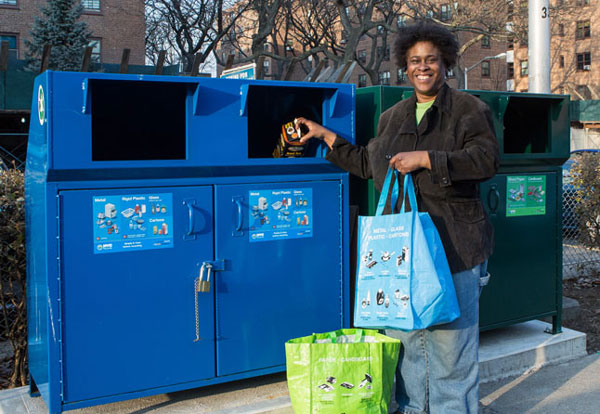
Pomonok Houses resident Pamela Azore is an Environmental Ambassador for the NYCHA Recycles! Program.
NYCHA installed recycling bins in every NYCHA development in only 22 months. The 1,500 bins make it possible for more than 400,000 residents to recycle paper, glass, metal, and plastic.
With the help of the NYC Department of Sanitation and GrowNYC, NYCHA trained 1,400 employees and nearly 12,000 residents about the recycling process. To spread the word about recycling to their neighbors, more than 60 residents have been trained as volunteer Environmental Ambassadors.
Recycling at NYCHA is a big part of Mayor Bill de Blasio’s “Zero Waste” initiative, which calls for the reduction of the city’s solid waste by 90 percent by 2030.
Farms at NYCHA builds new urban farms at three NYCHA developments
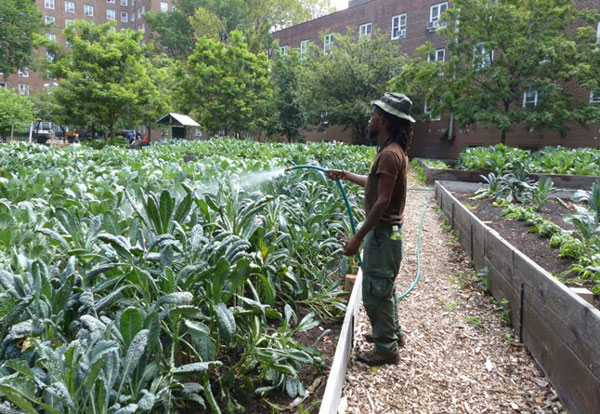
Green City Force Team Leader Andrew Lewis cultivates fresh produce at the Red Hook Houses farm.
Farms at NYCHA was launched in 2016 to expand healthy food access, provide youth workforce and leadership development, and promote sustainable public housing communities. The farms are constructed and operated by 18- to 24-year-old NYCHA residents who are Green City Force (GCF) AmeriCorps Members. GCF deployed two teams of resident leaders to build, cultivate, and lead community programming at the three farms built last year.
The program creates a new model for urban farming grounded in sustainable, local leadership, and was recently recognized as a 2017 AmeriCorps Project of the Year. Two more farms, one each in Staten Island and the Bronx, are planned for this year.
Farms at NYCHA is part of Building Healthy Communities (BHC), a city-wide partnership focused on improving health in 12 neighborhoods throughout the city.


